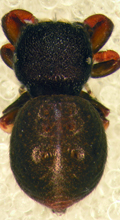Latest News Archive
Please select Category, Year, and then Month to display items
25 February 2022
|
Story Lacea Loader
![]()
The Qwaqwa Campus of the University of the Free State (UFS) will reopen on 28 February 2022. The decision was made by the university management today after the campus was closed on 22 February 2022 due to violent protest action.
From 28 February 2022 to 4 March 2022, all classes will be presented online.
Students will be informed by their respective faculties about the model of academic delivery that will be followed from 7 March 2022.
The arrangement is estimated to continue for two to three weeks at the most, after which the academic programme will return to the approved teaching plans for 2022.
Issued by:
Lacea Loader
Director: Communication and Marketing
University of the Free State
23 February 2022
UFS entomologists describe a new spider species
2014-02-19
|
 |
It is about 3mm in size and almost looks like a ladybird, but this new spider is the cause of great excitement at the University of the Free State’s (UFS’s) Department of Zoology and Entomology.
The new species of spider, now known as Rhene amanzi, was recently described for the first time and was ‘introduced’ to other arachnologist at the recent congress of the African Arachnology Society at Amanzi Private Reserve.
Dr Charles Haddad, senior lecturer in the UFS’s Department of Zoology and Entomology, said they already stumbled upon the male spider in 2010 when a student was doing research at the reserve. After a very long process, the spider was described and a couple of weeks ago, whilst at the congress, they also found the female.
“Up to now we only know that the spider lives in trees in the Brandfort area. The range could be wider, but since it was only described recently, other arachnologists will only now be able to identify accurately.”
Dr Haddad says they still have to determine how many eggs the female is able to lay, what the spider’s life cycle looks like and what their habitual preferences are.
“What we do know is that it probably isn’t poisonous and that the spider imitates a ladybird in order to protect itself against predators.”